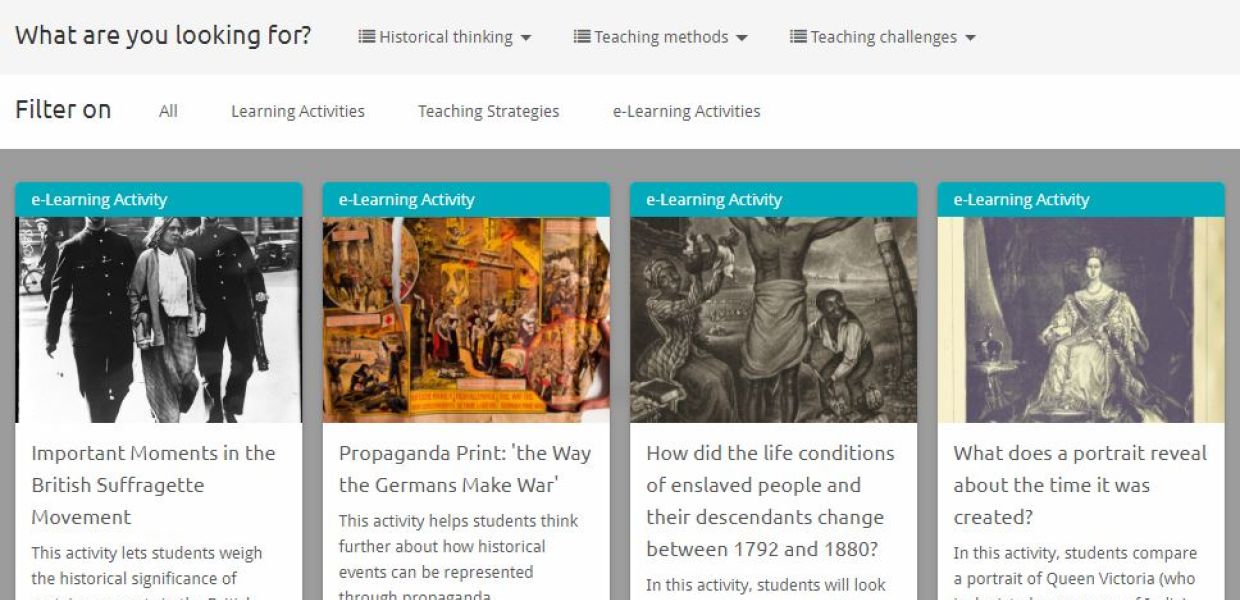EUROCLIO and Europeana: building better resources for teaching history
Discover the achievements of the past year's collaboration between Europeana and EUROCLIO.

- Title:
- Historiana screenshot
- Copyright:
- CC BY-SA
Over the course of Europeana DSI2 (July 2016 to August 2017), EUROCLIO has led the development of 20 learning activities for educators using Europeana content. As part of our partnership, EUROCLIO has also been working on an innovative new eLearning Environment for history educators, which will be hosted on the revamped Historiana. The goal of Historiana is to make it as simple as possible for history educators to enrich their teaching materials with Europeana’s digital cultural heritage content.
The 20 eLearning Activities
The topics covered are diverse and focus on historical events and developments that are important in classrooms across Europe (such as the two world wars, the Holocaust, and the industrial revolution) or people (such Stalin and the Suffragettes) that are of cross-border importance. The eLearning Activities are designed to help student acquire historical thinking skills (such as analyzing historical sources, or applying historical knowledge). The eLearning Activities demonstrate how the eActivity Builder can be used, and how the different building blocks function. The different building blocks make it possible for history educators to add text, images, embed anything, ask questions, and create sorting activities with different backgrounds.
A screenshot of eLearning Activities. EUROCLIO - European Association of History Educators, Design by Nique Sanders, CC BY-SA.
Adaptability in the eLearning environment
Adaptability is key in the new eLearning environment. Although historical themes may be common across Europe, they may be taught at different educational stages. Although the eLearning Activities are designed for students between 12 - 18 years, they can be easily made more challenging or more accessible. This could mean providing more or less information about the source or the historical context, or providing or removing additional support in the assignments.
History educators can create their own eLearning Activities by combining building blocks that each have their unique features. Educators will be able to share the resources not only with their students and for their own use, but also with other educators. This is a big step forwards in encouraging Historiana’s users to effectively employ digital heritage in their educational materials.
A screenshot of the Activity Builder used to create and edit eLearning Activities. EUROCLIO - European Association of History Educators, Design by Nique Sanders, CC BY-SA.
Expertise and peer review
The eLearning Activities benefit from a wide range of perspective and expertise. They were developed by the Historiana Teaching and Learning team, a group made up of history educators from six European countries (Croatia, Cyprus, Iceland, Georgia, the Netherlands, and the United Kingdom). All the authors are currently teaching history at school, or are active as trainers of history teachers as part of initial teacher training or continued professional development. Each eLearning Activity has also been peer reviewed.
A screenshot of an eLearning Activity from a student’s perspective. EUROCLIO - European Association of History Educators, Design by Nique Sanders, CC BY-SA. The sources used in the activity are all from the Europeana Collections (Michael Graham-Stewart Slavery Collection of the National Maritime Museum, Greenwich, London, CC BY-NC-SA 4.0).
In the next year, Europeana and EUROCLIO will work on the testing and further improvement of the Historiana eLearning Environment, the creation of new exemplar eLearning Activities, and will provide online and offline trainings.
Stay up to date with all future developments by joining the Europeana Education LinkedIn group or register to the EUROCLIO newsletter (by filling in the form in the footer of euroclio.eu/!
For questions, suggestions, bugs, etc. please contact steven@euroclio.eu
